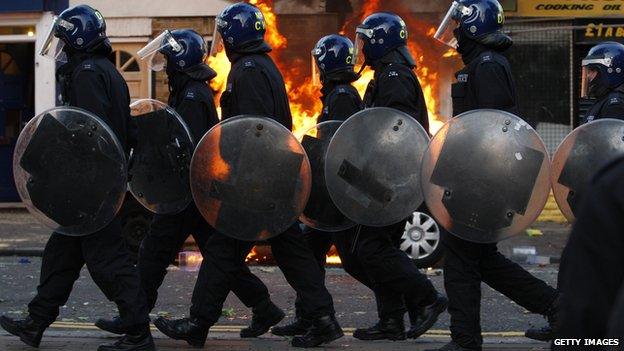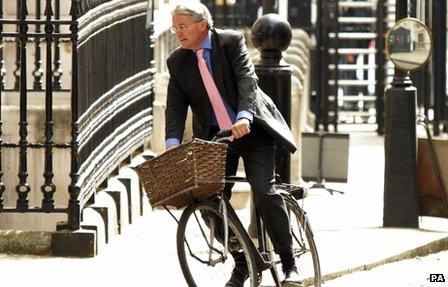Police Federation must change, says independent review
- Published

The Police Federation represents officers up to the rank of chief inspector
The Police Federation of England and Wales should be changed from "top to bottom", an independent panel has said.
The damning report, external found a "worrying loss of confidence and competence" within the federation and a "serious loss of influence" outside.
It said the way the federation, which represents officers, had opposed police reforms and launched personal attacks were "strategic failures".
The review was set up after criticism in the wake of the "plebgate" affair.
Meanwhile the federation's chairman has apologised to the former cabinet minister, Andrew Mitchell, for the actions of an officer who has admitted lying over his involvement in the saga.
The federation, which represents about 127,000 officers at the rank chief inspector and below, set up the review under former Home Office permanent secretary Sir David Normington last year.
Its report said the federation had faced a "perfect storm" of challenges for its members, including job losses, pay being "held down", increased pension costs and changes to working conditions, as well as major policing reforms.
But there was an "almost universal perception" among members that it had been a "weak voice" during the changes, tending to "oppose rather than engage" and putting forward ideas "too late to be influential".
The report also found the federation had reserve funds of £64.5m - about £35m held by local branch boards, which it said operated "almost as separate businesses".
A survey carried out for the review found 91% of federation members wanted it to change.
It also found:
evidence of "bad behaviour", poor treatment of staff and targeting on social media of representatives who held different views
"hoarding of information including financial information"
under-representation of women and minority ethnic officers
lack of transparency in funding arrangements
Sir David said there was an "urgent need" for the federation to "regain the trust of its members" and its "culture of secrecy" over money had to change.
The review panel made 36 recommendations. These included:
creating a revised core purpose reflecting a commitment to act in the public interest
the abolition of separate rank committees (constables, sergeants, inspectors)
a 25% cut in subscription fees, to be funded by reserves
all accounts and expenses to be published and national expenses guidelines set
a new director of equality and reserved seats for some minority groups
a new "performance and standards agreement" outlining what is expected of each federation representative.
The "plebgate" row began in September 2012 when Andrew Mitchell, then Tory chief whip, was accused of calling officers "plebs" after they refused to let him cycle through Downing Street's main gates.
Three weeks later, Mr Mitchell met three Police Federation officers who afterwards claimed he had not elaborated on the row. But a secret recording of the meeting made by Mr Mitchell showed he had in fact denied using the word "pleb".

The "plebgate" affair concerned comments by Andrew Mitchell
The Independent Police Complaints Commission (IPCC) is now investigating the three officers amid accusations they lied about what was said. But the federation has called the probe "unlawful" and responded by announcing legal action against the IPCC.
The federation's chairman, Steve Williams, has apologised to Mr Mitchell for the actions of PC Keith Wallis, who falsely claimed to have witnessed the row in Downing Street.
PC Wallis sent an email to his local MP John Randall, the then Conservative deputy chief whip, wrongly saying that he had seen the altercation.
He has pleaded guilty to a charge of misconduct in public office, and offered to resign.
Mr Mitchell said he was "grateful" to Mr Williams for his apology, and would "welcome the opportunity to meet with him for a constructive discussion in the very near future".
On the report by Sir David Normington, Mr Mitchell said he believed the conclusions were "right".
'Uncomfortable reading'
The report said the case highlighted the "extent to which some representatives feel they can pursue local action and campaigns regardless of the impact on the wider federation and the views of their colleagues".
It said allegations some federation representatives had personally targeted successive home secretaries Andrew Mitchell and Tom Winsor - who reviewed police pay and conditions - brought the federation into disrepute and put the police reputation for "impartiality and integrity" at risk.
The report did highlight some positives.
It recognised the value of good local representatives, particularly in individual disciplinary cases and added some branch level representatives were "taking the initiative in reducing costs of representation".
Police Federation chairman Steve Williams said the report was "uncomfortable reading" but agreed "deep cultural change" was needed.
"The federation needs to embrace this challenge, however difficult that may be."
If it did not, others would "do it to us", he warned.
- Published20 January 2014
- Published30 October 2013
- Published17 January 2014
- Published12 January 2014